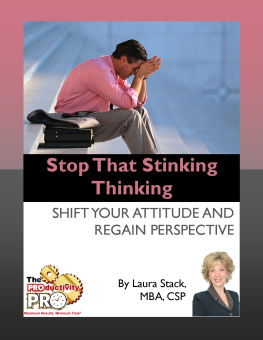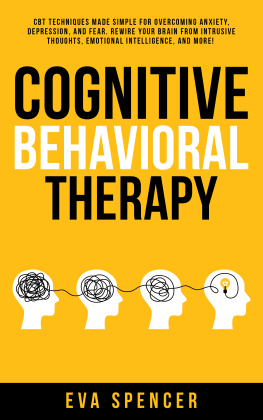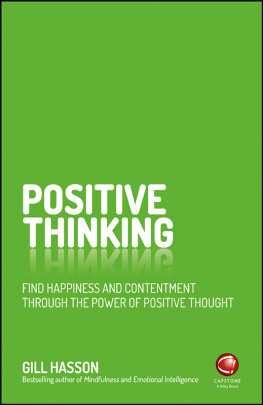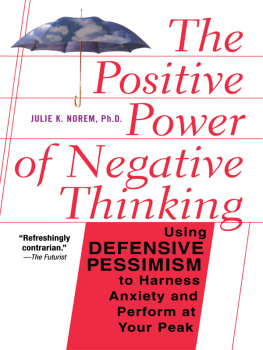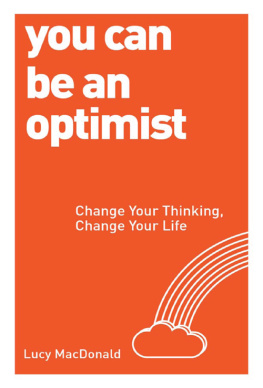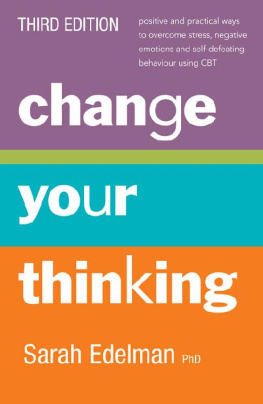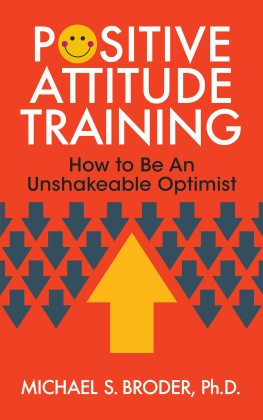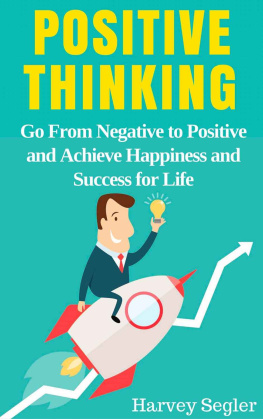STOP THAT STINKING THINKING:
Shift Your Attitude and Regain Perspective
I have people in my life that I just love being around. They lift my spirit; they give me joy. Other people just suck the life rightout of me. Theyre so negative I walk away feeling emotionally drained. Meeting these de-energizers is often unavoidable, so I waste time dreading themand mentally rehearsing how I will cope. And after a dishearteninginteraction, I seek out people to vent my frustrations to, who in turnexperience the effects of my frustration with decreased energy.
Negativity not only drains the people we meet, but affectsthe energy of people we might even know. Attitude, negative or positive, iscontagious. Which one are you spreading?
In this ebook, I'm going to teach you different ways to stopthat stinking thinking, shift your attitudes, and regain your perspective.
1. Pessimism
Stop negative thoughts in their tracks! The first thingthat makes our attitude stink is the way we think. Pessimism, self-doubt,complaining, whining, and general negativity: its all the same thing,stinking thinking.
Have you ever been around people who have it made, and yetall they do is complain? The movie Lost in Translation is a greatexample of this. Its basically about well-off people who are miserable allthe time. If youre reading this, chances are you have a roof over your head,plenty to eat, a reliable vehicle, and clothes in your closet, some of whichyou havent worn for a year. Now, this concept does not equate materialismwith happiness, but so many people overlook all that they have to be gratefulfor, and complain about every little everyday thing that goes wrong. The milkspills, the faucet drips, the computer crashes; hey, thats just life. Hencethe saying, If its not one thing, its another.
The things that go right during the course of a given dayfar outweigh the things that go wrong. So stop negative thoughts in theirtracks. Its all too easy for us to internalize the harsh messages society feedsus. Perhaps we endured hypercritical parents or teachers during childhood. Perhaps weve attended religious institutions that engrained guilt and shame inus, due to the belief that people are inherently bad. Perhaps were constantlybombarded with images of digitally enhanced supermodels.
Monitor your thoughts. Are your thoughts mostly positive ormostly negative? How do you let these external things affect you now? Perhapsthats one of the biggest tests of your life, this learning how to transformthe negative into positive. Its just like turning vegetable scraps into richcompost for your daisy garden. Remember the old saying, As you go throughlife, brother, whatever your goal, keep your eye on the donut and not on thehole.
Would youever talk to a friend the way that you talk to yourself? Try reassuringyourself the same way youd reassure a friend. Lets say youre getting readyfor work, and your boss is conducting your annual evaluation today and youre alittle nervous. So while combing your hair, your concerns morph into thislittle movie inside your head where the boss calls you an idiot and you jump toyour feet and a screaming match ensues. Why are you thinking that? Stop thatthought immediately. Replace it with images of your boss giving you ample,positive feedback during a great evaluation, with big smiles on both yourfaces, ending with you getting a raise!
So instead of thinking, The Board will never put me in theCEO seat because Im a woman, think, The Board is going to name me CEObecause I masterminded netting $8.7 million for this company last year. Instead of thinking, The bank wont give me that business loan because Im ofa different descent than the loan manager, think, The loan manager is goingto fall all over herself giving me a business startup loan because of my goldencredit rating.
We tend to create situations that dont even exist. So bevery careful about the negative thoughts that youre programming into yourhead.
2. Worrying
Worrying is one of the most ineffective, counter-productivethings you can do with a human mind. When you worry, you may be picturing anegative event in your mind and creating, in essence, the exact thing that youwant to avoid. Instead, you have to create alternative, positive mentalpictures.
When you become a parent, your number one concern in life iskeeping your children safe and sound. I know this to be true, since I havethree children myself. One mother of four young children once confided one ofher greatest fears to me. At the time, she lived in a mountainous area thatwas prone to flash flooding in the spring, and she relayed that she had aparalyzing fear of a flash flood engulfing her minivan with all four childreninside, three of whom still required car seats. How would she alone be able toget the smallest three children out of their car seats and hold them in herarms while swimming? Would the oldest child be a strong enough swimmer to savehimself? Plus, one of the other children... Oh my goodness!
Imagination, admittedly, is a built-in survival tool thathas furthered the human races evolution, but it can rage out of control if youdont keep it in check. This mothers concern was very practical, but it kepther from wanting to even drive in the rain. Yes, you need a game plan foremergency situations, but you cant let them consume your mental energy.
If you find yourself worrying about a particular scenario,stop thinking about it right away. Then immediately replace it with a positivethought about the same scenario. I told the mother to come up with a game planand replace her worry with an image of her family always traveling safely ondry roads.
3. Anger
Like worry, anger is an evolutionary tool that keeps ussafe. Its very helpful when it comes to protecting ourselves or our lovedones from harm. But if were chronically angry, internally or outwardly, werecompromising our own health and well being. The physiological affects of angerinvolve a two-phase blast of adrenalin-related neurotransmitters. The firstblast is a fight or flight response to energize the body for immediate action,and that lasts for just a few minutes. The second surge, however, persists foras long as several hours to several days.
Chronic anger control problems can predispose us towardscardiac risk factors, such as high blood pressure, high cholesterol, and weightgain. And these risk factors can trigger a life-threatening heart attack oranother coronary event, especially during an explosive outburst. Angers badattitude cousins are frustration, jealousy, resentment, hatred, judgment, andcriticism.
So instead, listen to what your anger is teaching you. Anger is a normal human emotion, so you have to respond to it carefully. Eventhe calmest of personalities erupts in anger now and then, and it requires agreat deal of restraint on your part to rationally deal with others when theyare explosively angry, and to properly channel and express your own anger.
Instead of lashing out, becomeintrospective about what anger is trying to tell you.
Perhaps youre discovering boundaries that need to be setwith another person. Perhaps it will teach you how to deal more effectivelywith a difficult personality. As you learn these lessons and put them inaction, your behavior will naturally create maximum pressure for other peopleto act fairly toward you.
If youre faced with someone whos explosively angry, remaincalm. Of course, this is harder than it sounds, but throwing a container oflighter fluid on an already raging fire is never a good idea. Breathe deeplyand slowly to keep the situation from escalating. Use a calm tone of voice andpolitely explain that there is no need to yell, and that youre open tolistening to his or her concerns.

